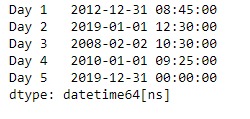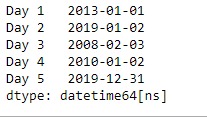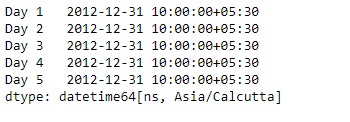Series.dt可用於以datetimelike的形式訪問序列的值並返回幾個屬性。 Pandas Series.dt.ceil()函數對數據執行ceil操作到指定的頻率。
用法: Series.dt.ceil(*args, **kwargs)
參數:
freq:最高頻率指標
返回:DatetimeIndex,TimedeltaIndex或係列
範例1:采用Series.dt.ceil()函數將給定係列對象的日期時間數據設置為指定的頻率。
# importing pandas as pd
import pandas as pd
# Creating the Series
sr = pd.Series(['2012-12-31 08:45', '2019-1-1 12:30', '2008-02-2 10:30',
'2010-1-1 09:25', '2019-12-31 00:00'])
# Creating the index
idx = ['Day 1', 'Day 2', 'Day 3', 'Day 4', 'Day 5']
# set the index
sr.index = idx
# Convert the underlying data to datetime
sr = pd.to_datetime(sr)
# Print the series
print(sr)輸出:

現在我們將使用Series.dt.ceil()函數將給定係列對象中的日期時間值設置為“每日頻率”。
# ceil to daily frequency
result = sr.dt.ceil(freq = 'D')
# print the result
print(result)輸出:

正如我們在輸出中看到的,Series.dt.ceil()函數已成功將給定係列對象中的日期時間值設置為指定的頻率。
範例2:采用Series.dt.ceil()函數將給定係列對象的日期時間數據設置為指定的頻率。
# importing pandas as pd
import pandas as pd
# Creating the Series
sr = pd.Series(pd.date_range('2012-12-31 09:45', periods = 5, freq = 'T',
tz = 'Asia / Calcutta'))
# Creating the index
idx = ['Day 1', 'Day 2', 'Day 3', 'Day 4', 'Day 5']
# set the index
sr.index = idx
# Print the series
print(sr)輸出:

現在我們將使用Series.dt.ceil()函數將給定係列對象中的日期時間值設置為每小時頻率。
# ceil to hourly frequency
result = sr.dt.ceil(freq = 'H')
# print the result
print(result)輸出:

正如我們在輸出中看到的,Series.dt.ceil()函數已成功將給定係列對象中的日期時間值設置為指定的頻率。
相關用法
- Python pandas.map()用法及代碼示例
- Python Pandas Series.str.len()用法及代碼示例
- Python Pandas.factorize()用法及代碼示例
- Python Pandas TimedeltaIndex.name用法及代碼示例
- Python Pandas dataframe.ne()用法及代碼示例
- Python Pandas Series.between()用法及代碼示例
- Python Pandas DataFrame.where()用法及代碼示例
- Python Pandas Series.add()用法及代碼示例
- Python Pandas.pivot_table()用法及代碼示例
- Python Pandas Series.mod()用法及代碼示例
- Python Pandas Dataframe.at[ ]用法及代碼示例
- Python Pandas Dataframe.iat[ ]用法及代碼示例
- Python Pandas.pivot()用法及代碼示例
- Python Pandas dataframe.mul()用法及代碼示例
- Python Pandas.melt()用法及代碼示例
注:本文由純淨天空篩選整理自Shubham__Ranjan大神的英文原創作品 Python | Pandas Series.dt.ceil。非經特殊聲明,原始代碼版權歸原作者所有,本譯文未經允許或授權,請勿轉載或複製。
